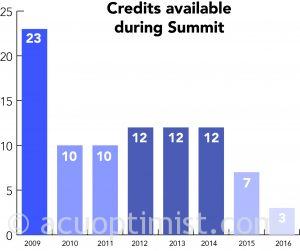
The number of credits available during Summit has dropped over the years.
The 110th annual Summit lectures begin Sunday night and this year, students have the opportunity to earn three spiritual formation credits over the four days of events and sessions across campus. Yes, three.
In years past, students viewed Summit as the credit goldmine – like in 2009 when students could earn 23 credits (which is just insane) and even as recently as 2014 when 12 credits could be acquired.
Last year, in light of the shift from Chapel credits and multiple-credit forum to the more versatile spiritual formation credit, the Office of Spiritual Development decided to limit credits offered during Summit to sessions in Moody, giving students the chance to earn seven credits in four days. But we’re left wondering, where have all the Summit credits gone?
If Summit and the Chapel office are looking to see students show up and be engaged over the next several days, they will have to offer more than the hope of spiritual formation.
Jan Meyer, director of spiritual formation, said the decision to offer only three credits was influenced by multiple factors like available space and the abundance of credit opportunities for students offered throughout the semester.
“We had made the decision over the summer to limit the number of Summit opportunities since students would already be choosing from a larger pool of options for the fall,” said Meyer. “Our goal is to have more students engaged on a regular basis.”
The downward credit trend may leave some scratching their heads, asking, “Isn’t three credits on Monday, Tuesday and Wednesday at 11 a.m. just pretty much any old regular week of Chapel?”
Well, yes.
In Chapel and Summit’s defense, part of this decision is about space. Summit moved afternoon and evening keynote sessions to Cullen Auditorium. Both offices decided to not offer credit during these times to keep guests from being pushed out by students on their quest to 55.
Logistically, this is the decision that had to be made – but it doesn’t keep us from mourning the passing of the trusty multiple-credit forum, a frequent friend to students in year’s past.
Last year, the Chapel Office granted credit to Summit sessions that faculty sponsors requested to be spiritual formation events, however they didn’t receive any requests for Summit this week.
Chapel/Spiritual Formation/Quest credits have become this currency of sorts students are looking to acquire in exchange for time, sometimes attention, and perhaps, if you’re lucky, spiritual formation.
Meyer said, “We want students to seek to grow and deepen in their faith….but we know that does not always have to be tied to a credit for everything that a student does. Unfortunately, there is a mindset at work among some that unless there is a credit tied to it, there’s no reason to attend. That is not what we believe to be the case for Summit, and we encourage students to attend, be challenged, and participate in the blessing of this on our campus.”
Summit is an incredible opportunity and resource for students, but it will continue to be underutilized by students if there isn’t some sort of stake in it for them.
Maybe it’s a shallow view of twenty-somethings, but odds are, even students who want to tap into the wealth of spiritually-forming sessions at their fingertips are picking and choosing for what they’ll exchange their time.
While the argument of being too busy for Chapel can be swiftly refuted by those in charge, we think there is an argument for valuing student’s time amidst the loosely-held-together chaos most of the student body lives in.
As much as we want to think students will spend all of their free time next week listening in to some of the rich conversations happening just because they want to, that probably won’t be the case.
We aren’t asking for 23 credits in four days, but maybe just a few more in a week dripping with opportunity.

“If Summit and the Chapel office are looking to see students show up and be engaged over the next several days, they will have to offer more than the hope of spiritual formation.”
Showing up and being engaged are two different things. The solution is to offer spiritual events and let those who wish to attend do so.